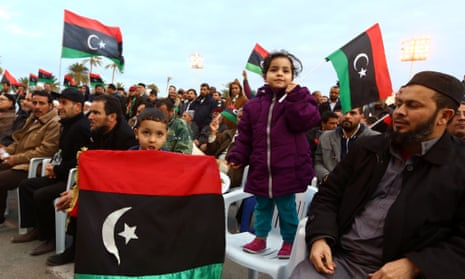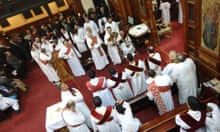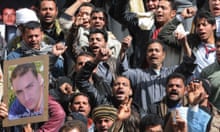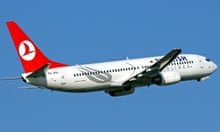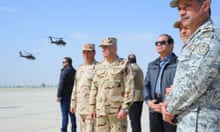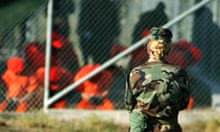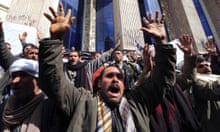“It was better under Gaddafi,” says the young Libyan student, studying the froth bubbling over the top of his cappuccino in a cafe in Tunis as he contemplates the revolution that swept Muammar Gaddafi from power four years ago. “I never thought to say this before, I hated him, but things were better then. At least we had security.”
Tuesday marks the fourth anniversary of that revolution but nobody is celebrating. Egyptian air strikes now hammering Islamic State positions in the east of the country, in response to the beheading of 21 Egyptian Christians, is a further twist in an already grim civil war. Four years ago the student picked up a gun and joined rebel militias. Now he wishes he had stayed home.
“If I had that time again, I would not join [the rebels],” he says. Like many of his former comrades, he has left the country, but won’t give his name, fearing retribution against his family back home.
“In the past, we would have a party for the anniversary of the revolution, but not this time,” says Ashraf Abdul-Wahab, a journalist. “A lot of people tell you it was better under Gaddafi, that the revolution was a mistake. What they mean is, things are worse now than they were then.”
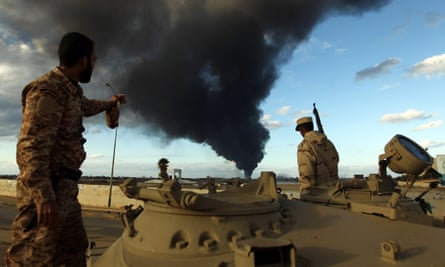
Libya’s Arab spring was a bloody affair, ending with the killing of Gaddafi, one of the world’s most ruthless dictators. His death saw the rebel militias turn on each other in a mosaic of turf wars. Full-scale civil war came last summer, when Islamist parties saw sharp defeats in elections the United Nations had supervised, in the hope of bringing peace to the country. Islamists and their allies rebelled against the elected parliament and formed the Libya Dawn coalition, which seized Tripoli. The new government fled to the eastern city of Tobruk and fighting has since raged across the country.
With thousands dead, towns smashed and 400,000 homeless, the big winner is Isis, which has expanded fast amid the chaos. Egypt, already the chief backer of government forces, has now joined a three-way war between government, Libya Dawn and Isis.
It is all a long way from the hopes of the original revolutionaries. With Africa’s largest oil reserves and just six million people to share the bounty, Libya in 2011 appeared set for a bright future. “We thought we would be the new Dubai, we had everything,” says a young activist who, like the student, prefers not to give her name. “Now we are more realistic.”
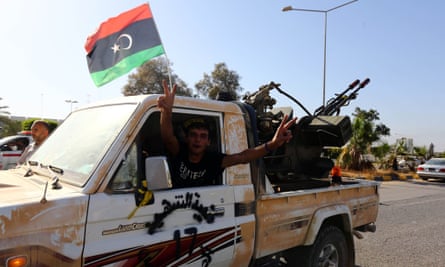
Just why Libya’s Arab spring went so badly wrong is a matter of hot debate. Some blame Nato for not following up with political support after its air campaign; some argue that it was the lack of institutions to make democracy work, or Libya’s atomised tribal structure that makes cooperation hard and magnifies distrust. Many have simply given up.
“So many of the revolutionaries of four years ago have gone to ground, they have fled, ” says Michel Cousins, editor of the English-language Libya Herald newspaper. “They say a revolution eats its children.”
Journalists flocked to Libya four years ago. Now Tripoli, after a series of Isis attacks, is too dangerous for all but the most intrepid, while Tobruk, in lockdown after a series of car bombings, has told the media to stay away.
The new government, hunkered down in a hotel in Tobruk, is riven by disputes, with many fearing it will fragment. In Tripoli, Libya Dawn has struggled to impose firm rule on a city now giving way to anarchy. Dawn commanders have reconvened the former government, the general national congress, but true power lies with the militias.
Zealots are making themselves felt in the capital, which was once Libya’s most liberal city. Women can no longer leave the city, on the few flights still operating, unless they have a male chaperone. Gunmen have attacked statues, Sufi mosques, a library and the art college, warning against displays of idolatry. Beauty salons are closed and schools segregated by sex. This week one unit announced the arrest of a woman for witchcraft, posting photographs of her and a mutilated black cat.
“I know people say it was safer in Gaddafi times but not for everyone; one of our relatives was kept in prison then, he was starved and beaten,” says a Tripoli resident, again declining to give her name. “Our problem were the elections. Many of the candidates were full of enthusiasm but with no experience in politics.”
Meanwhile, Benghazi, Libya’s second city, where the revolution first began with protests outside the courthouse, is being transformed into an Arab Stalingrad by fighting between government troops and Islamist militias. Four years ago, Courthouse Square was festooned with flags, revolutionary banners and youngsters singing songs in brightly painted tents. Now it is a pulverized wilderness.
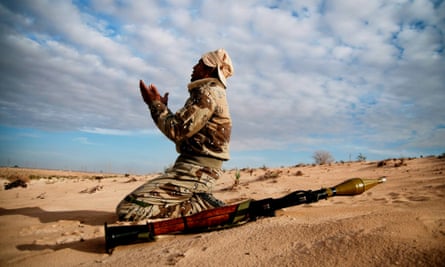
Nato was midwife to Libya’s revolution, its bombing the key to victory, but alliance leaders now look on aghast at the result, not least the growth of Isis. Unknown in Libya before last summer, Isis has taken advantage of the chaos to expand rapidly. Its execution of the Egyptian Christians, captured in December and January, has triggered an Egyptian response that promises to turn the war into an international conflict. London, Paris and Washington, prime movers behind Nato’s intervention, worry that Isis could launch strikes on Europe across the Mediterranean. Meanwhile, Italy is dealing with the arrival of tens of thousands of migrants funnelled through Libya, many drowning on their hazardous journey.
Amid the chaos, some politicians on both sides are scrambling to make a deal. “We are fearing the disintegration of the state,” said parliament’s deputy speaker, Mohammed Ali Shuhaib, who spent 10 years in political prison under Gaddafi. He is pushing for a new unity government. “There is hope, not all Libya Dawn are fanatics.”
The problem is that Libya is now polarized, a majority backing the government, a sizable minority turning to Libya Dawn, with the room for compromise shrinking fast. The UN’s envoy, Bernadino León, abandoned peace talks in Geneva last month after Libya Dawn refused to show up.
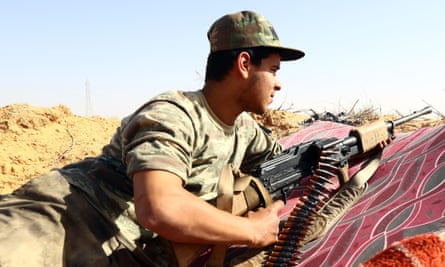
Egypt, allied with the recognised government, may now tip the scales in favour of Tobruk. Already, by dint of its international recognition, the government is acquiring military hardware, an expanding air force proving the trump card in recent battles with Libya Dawn.
León insists his priority is saving Libya before it attains complete meltdown. With oil exports plunging, the country is surviving on fast-depleting foreign reserves. He fears Libya will soon run out of money to feed itself, run power plants, and fuel the pumps that supply the cities with water from deep wells in the Sahara. “Libya is falling really very deeply into chaos,” he says.
For ordinary people, life is now a battle for survival, and amid the power, water and petrol cuts, the most acute shortage is optimism, a quality flowing so abundantly four years ago. Where it exists at all, it is cautious and circumspect. “Martin Luther King said ‘I have a dream’, and I still have the dream,” says Shuhaib. “It’s not the same dream as four years ago, people now are disappointed and frustrated, but the dream is there.”
